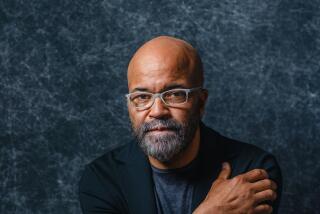EGON MONK RETROSPECTIVE DUE AT USC
- Share via
It is possible to consider yourself knowledgeable about the New German Cinema and never have even heard the name of Egon Monk, who directed some of the most outstanding and influential films for German TV--and for subsequent theatrical release--in the early ‘60s.
A protege of Brecht who moved to West Germany in 1954, Monk suffered an eclipse in television when he tried to return to the theater in 1968, yet kept on working in TV, enjoying more acclaim than ever for his 1983 four-hour TV adaptation of Feuchtwanger’s 1933 novel “The Oppermanns.”
Now the Max Kade Institute for Austrian-German-Swiss Studies at USC, in cooperation with the Goethe Institute and USC’s School of Cinema, will present five Monk films starting with “Farmers, Functionaries and Fireworks (1964), which will screen Tuesday at 7:30 p.m. in USC’s Taper Hall 101 along with the short film “The Moment of Peace” (1965). The first, a story set in a troubled town toward the end of the Weimar Republic, was not available for preview; the second is a brief, beautifully wrought vignette expressing the joy of war’s end.
Screening Wednesday at USC in George Lucas Building 108 are “A Day in the Life” (1965) at 9 a.m. and “Lambs to the Slaughter” (1963) at 8:30 p.m. “Friday in Wilhelmsburg” screens Thursday at 7:30 p.m. in Taper Hall 101. Monk will discuss his work after each screening. Information: (213) 743-8066.
Monk has stated his artistic task: “To dig out the truth from beneath the rubble of the obvious, to connect the individual strikingly to the general, to keep hold of the particular within the larger process as a whole: That is the art of the realist.”
He accomplishes this in his films, which are remarkable for their rigorous austerity and acute perceptiveness. The documentary-like realism of “A Day in the Life” gives a harrowing you-are-there immediacy to Monk’s meticulous re-creation of concentration camp existence.
Perhaps the most ambitious of the films is “Lambs to the Slaughter,” which was written by Christian Geissler. (“ Cattle to the Slaughter” is more like it, for the film has both prologue and epilogue showing stockyard cows docilely meeting their fate.) The film takes place aboard a speeding train in a luxurious first-class car in which things begin to go mysteriously wrong--doors and windows refuse to open, the train doesn’t stop at stations where it’s supposed to, and finally the emergency brakes don’t work. “Lambs” develops not into a thriller but rather a parable about blind complacency in the Adenauer era of West Germany’s “economic miracle.” Except for an outspoken stenographer, no one else in the car really wants to know what’s happening or why; it’s the same willful ignorance that made possible the existence of the concentration camps.
If “Lambs to Slaughter” anticipates Fassbinder’s trilogy set against the “economic miracle” and is also an early expression of feminist sentiments, the devastating “Friday in Wilhelmsburg” brings to mind Godard’s contemporaneous “A Married Woman” in its attack on the consumer mentality. Set in the sterile, raw new structures of Hamburg’s Wilhelmsburg district, it focuses on a young working-class couple struggling to get ahead and chagrined at the prospect of becoming parents.
Two new series start this week. UCLA’s “The Music Hall Tradition: British Musicals and Comedies” begins Saturday at 7:30 p.m. in Melnitz Theater with two Jessie Matthews musicals, “It’s Love Again” (1936) and the famous “Evergreen” (1934). Information: (213) 825-9261, 825-2581. The County Museum of Art’s “One Month of Love” begins Friday with Leo McCarey’s “An Affair to Remember” (1957) and Sydney Pollack’s “The Way We Were” (1973) at 1 p.m. and again at 8. Information: (213) 857-6111.
More to Read
Only good movies
Get the Indie Focus newsletter, Mark Olsen's weekly guide to the world of cinema.
You may occasionally receive promotional content from the Los Angeles Times.










